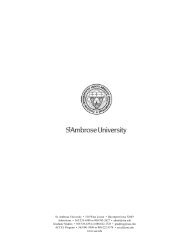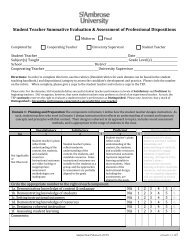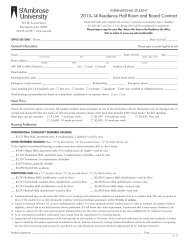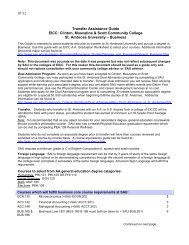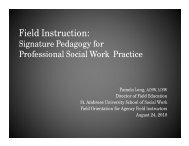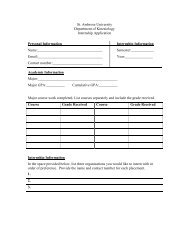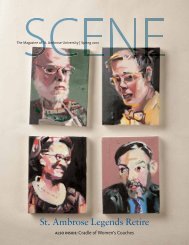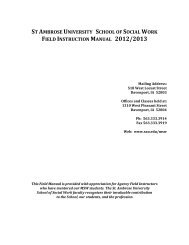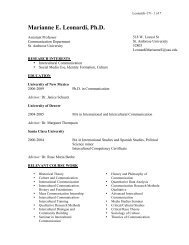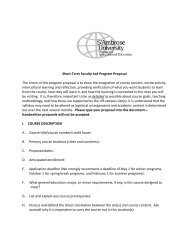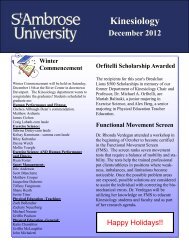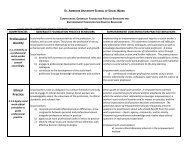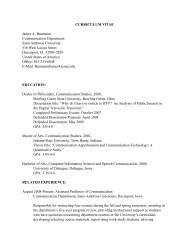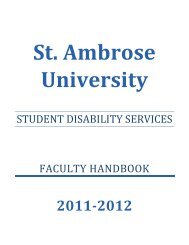St. Ambrose University 518 West Locust Davenport Iowa 52803 admit
St. Ambrose University 518 West Locust Davenport Iowa 52803 admit
St. Ambrose University 518 West Locust Davenport Iowa 52803 admit
You also want an ePaper? Increase the reach of your titles
YUMPU automatically turns print PDFs into web optimized ePapers that Google loves.
Graduate Curricula<br />
tional therapy. This may include but is not limited<br />
to any (or any combination) of the following:<br />
Psychosocial, physical disabilities, pediatrics,<br />
hand therapy, work hardening, home health,<br />
community, cardiac rehabilitation, and management.<br />
Clients may exhibit psychosocial and/or<br />
medical deficits affecting their work/productive<br />
activities, occupations of daily living, or<br />
play/leisure skills. Pass/No Pass grade.<br />
MOT 660. Optional Level II<br />
FW Experience<br />
1–6 credits<br />
Two weeks to three months of supervised fieldwork<br />
experience with any age client population.<br />
This Level II Fieldwork is an optional fieldwork<br />
and open to any traditional or non-traditional<br />
area within occupation therapy. Generally this<br />
fieldwork will be utilized for advancing students<br />
clinical skills into specialty areas. This may<br />
include but is not limited to any (or any combination)<br />
of the following: Psychosocial, physical<br />
disabilities, pediatrics, hand therapy, work hardening,<br />
home health, community, cardiac rehabilitation,<br />
and management. Clients may exhibit psychosocial<br />
and/or medical deficits affecting their<br />
work/productive activities, occupations of daily<br />
living, or play/leisure skills. Pass/No Pass grade.<br />
Master of Orthotic Science<br />
College of Human Services<br />
This program will commence in Fall 2001 and is<br />
in the process of submitting its curriculum to the<br />
Educational Policies Committee. Therefore, the<br />
following is subject to change and students<br />
interested in this program should contact the<br />
director of the department of Orthotic Science.<br />
Orthotics is a unique health profession that<br />
involves the design and creation of external<br />
braces (orthoses) that transfer forces to the body<br />
of persons with physical impairments as part of a<br />
treatment process. The capabilities and limitations<br />
of persons with physically disabling conditions<br />
of the limbs, spine or cranium are evaluated<br />
and treated by an orthotist to stabilize weak or<br />
injured joints, allow increased independence or to<br />
prevent progression of a deformity.<br />
Orthotists are involved in patient care in an<br />
office or hospital setting, are employed in industry<br />
as designers, manufacturers or component<br />
suppliers, or may be involved in academic positions<br />
as teachers or researchers in a university.<br />
The profession of orthotics combines medical<br />
knowledge, understanding of materials science<br />
and technology, manual dexterity, ingenuity, and<br />
clinical and technical training to produce a<br />
patient management professional.<br />
In 2000, responding to rapid advances in<br />
medicine and technology paired with a nationwide<br />
demand for orthotists’ services, <strong>St</strong>. <strong>Ambrose</strong><br />
<strong>University</strong> created the first entry-level Master of<br />
Orthotic Science (MOS) program in the nation.<br />
<strong>St</strong>. <strong>Ambrose</strong>’s MOS is recognized by the National<br />
Commission on Orthotic and Prosthetic<br />
Education (NCOPE) as a developing program<br />
and will seek full accreditation prior to graduation<br />
of its first class in 2003. Questions regarding<br />
accreditation can be addressed to the National<br />
Commission on Orthotic and Prosthetic<br />
Education (NCOPE) located at 330 John Carlyle<br />
<strong>St</strong>reet, Suite 200, Alexandria, VA 22314.<br />
Telephone: 703/836-7114, Web site:<br />
www.ncope.org.<br />
Graduates from NCOPE-accredited education<br />
programs are eligible for a residency in orthotics<br />
in an NCOPE-accredited residency site. These<br />
residency sites are available across the nation and<br />
the number of sites has been increasing yearly.<br />
The residency must be performed under the<br />
supervision of an orthotist certified by the<br />
American Board for Certification in Orthotics<br />
and Prosthetics, Inc. (ABC). Upon successful<br />
completion of the residency, candidates may take<br />
the national practitioner certification board<br />
examination administered by the American Board<br />
for Certification in Orthotics and Prosthetics, Inc.<br />
(ABC). Questions about practitioner certification<br />
210



